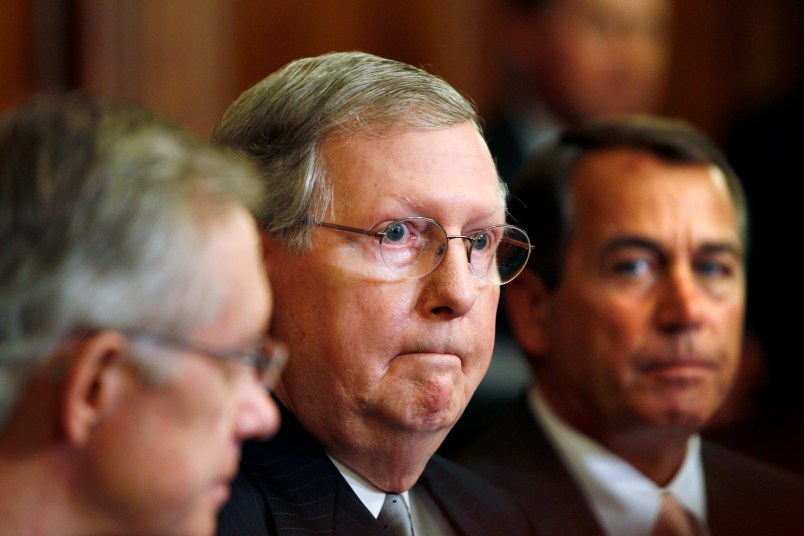Senate Majority Leader Harry Reid (D-NV) and Minority Leader Mitch McConnell (R-KY) gradually pieced together the makings of an agreement Monday to avert default ahead of a Thursday debt limit deadline. The emerging deal, which is not yet finalized, would also restore funding for the federal government, which has been shuttered since Oct 1.
The big question is whether a bipartisan agreement from the Senate will give Speaker John Boehner (R-OH) the political cover he needs to pass the bill over the objections of conservatives in the House, who will put enormous pressure on Boehner to reject or amend it.
The Senate framework extends the debt ceiling until early February, funds the government through early January and establishes budget conference negotiations by mid-December, ahead of the next increase in the borrowing limit, according to top Senate aides familiar with the talks.
“It would be a major victory to get this budget conference started after it’s been blocked for 6 months,” said a senior Democratic Senate aide. The set-up would be an ordinary conference — without preconditions or triggers — to reconcile the differences between the competing budgets passed by the House and Senate earlier this year. Conservatives in the both chambers have opposed entering into the budget conference process all year because they feared it would produce unacceptable compromises.
The government would be funded at the current sequestration level of $986.3 billion, straddling GOP demands to sustain the lower spending caps for as long as possible and Democrats’ demands not to lock them in permanently. The deal would provide new flexibility to government agencies when it comes to implementing the automatic spending cuts, and set up a battle over what to do about them during the next round of talks early in 2014.
The deal is unlikely to include a repeal or delay of Obamacare’s medical device tax, which has repeatedly come up during the debate. But according to sources, it may require Obamacare enrollees to verify their income eligibility prior to receiving subsidies, which Republicans have pushed. And it may delay for one year a little-known reinsurance tax under the Affordable Care Act aimed at stabilizing premiums. It’s a bipartisan carrot: Democrats support the idea because labor unions dislike the fee, and Republicans can claim they lopped off a damaging tax under Obamacare. Agreement on these two Obamacare-related items isn’t final but they remain under discussion in the late stages of the negotiation.
“The Republicans would get income verification, we would get a delay in the reinsurance tax,” said a Democratic source familiar with the talks.
Assuming the Senate is able to finalize its deal, major obstacles remain to completing it by Oct. 17, when the Treasury Department has warned the debt limit would be breached. For one, Sen. Ted Cruz (R-TX) and other arch-conservatives in the Senate can use the stalling powers at their disposal to blow past the deadline. But the biggest obstacle remains the House. The majority Republicans have been publicly mum as they wait to see the final deal, but privately they have serious concerns with what’s being discussed, and may amend it.
“If the Senate comes to an agreement, we will review it with our Members,” said Michael Steel, a spokesman for Boehner.
Boehner will likely find himself in a similar predicament to the one he faced on the so-called fiscal cliff at the end of 2012: a Senate-approved deal that is unacceptable to House conservatives. That means he’ll have to decide whether to modify the bill — and risk blowing it up — or bring it to a vote without the support of most GOP members. Such a move would endanger Boehner’s speakership, which he has worked strenuously to protect, even at the cost of a government shutdown, which is now in its 14th day.
But blowing past the Oct. 17 deadline threatens to send financial markets tumbling, and a default on the country’s debt is expected to have catastrophic global economic consequences.
Reid and McConnell have been in discussions since Saturday. McConnell met with Boehner for about half an hour on Monday as the deal was taking shape. An agreement may not be finalized until McConnell meets privately with Senate Republicans on Tuesday morning.
“We know this has been a difficult time for everyone,” Reid said Monday evening before recessing the Senate. “And Senator McConnell and I have been working diligently the last few days and we’re together in trying to arrive at a culmination of the efforts that have been ongoing for quite some time now. We’ve made tremendous progress. We are not there yet — but tremendous progress. And everyone just needs to be patient.”






